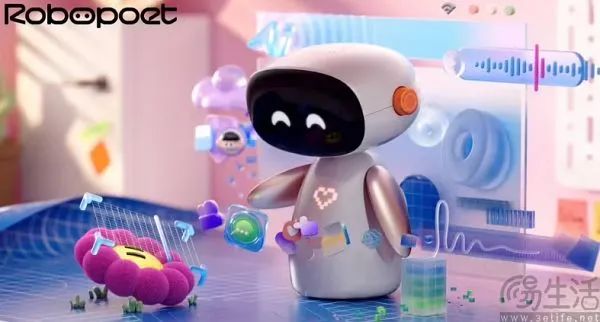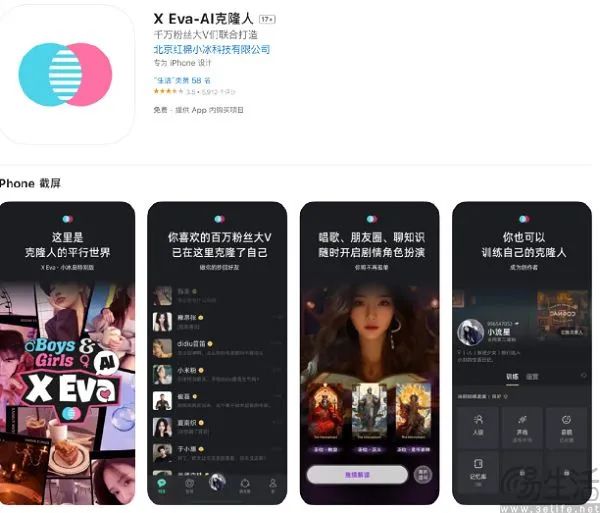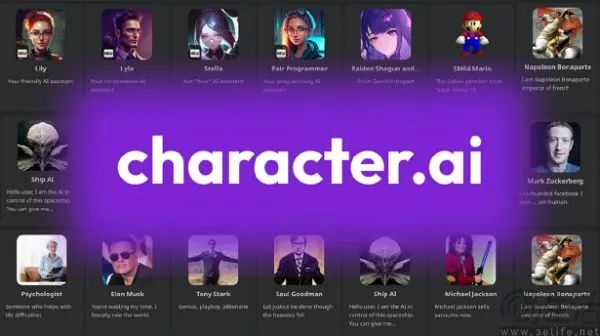As AI large models start a price war on the eve of 618 this year, when multi-modal large models represented by GPT-4o push the interactive experience to a higher level, it also means that killer AI applications may really have arrived. Singularity moment. Today, entrepreneurs in the AI industry no longer focus on large models, but have begun to try to use AI to empower specific application scenarios.

Recently, it was reported that Luobo Intelligence, founded by Sun Zhaozhi, the former head of Xiaopeng Robotics product design, has received an angel round of financing worth tens of millions of yuan. It is reported that the company focuses on AI companion robots. The first product is positioned as "AI trendy play" and is expected to be released and mass-produced next year. Sun Zhaozhi previously said in an interview with the media that Luobo Intelligence is committed to creating the emotional value of robots, and "next year is expected to be the first year of the explosion of AI accompanying hardware."
Coincidentally, ByteDance also seems to be eyeing "AI companion hardware". Volcano Engine launched the AI companion doll "conspicuous package" in the Mid-Autumn Festival this year. The latter embeds FoloToy's large-model AI movement Magicbox (Magicbox) on the basis of ordinary dolls. magic box). Although ByteDance stated that the "conspicuous package" is not an official product, it is obviously not an unintended goal of ByteDance.

In fact, "AI companionship" is an excellent scenario for the commercialization of AI technology. The biggest challenge in the AI industry at this stage is the "highbrow" attitude. The general public also has mixed opinions about AI. Although they express enthusiastic support in words, their actual actions are often "definitely next time." The current AI is not a lack of technical capabilities, but a lack of scenarios. Although advertisements from AI manufacturers are flying all over the place, users’ reactions are quite mixed. However, "AI companionship" is one of the few directions that has been verified by the market.
Earlier this year, OpenAI launched the GPT store. Originally, OpenAI thought that developers would use their imaginations to provide users with all kinds of strange AI applications based on the large GPT model. However, it turned out that a large number of developers chose to ignore OpenAI's restrictions on developing simulated companion GPTs. Virtual girlfriend/boyfriend-related GPTs soon became available. Just fill up the GPT store.

Even AI companions that provide emotional companionship are even more impressive in their ability to make money. While other AI applications are still looking to establish business models, whether it is Replika, Pi, Caryn AI in foreign countries, or Glow and X Eva in the domestic market, they have attracted a large number of users to pay. An indisputable fact is that as the construction of the information society matures, the atomization of individuals has become a common phenomenon in different regions and types of modern civilizations around the world. "Communication in solitude" has therefore become a way for many people to masturbate.
In the book "Group Loneliness", MIT sociology professor Sherry Turkle describes the social dilemma of modern people in this way, that is, people long to "be together" in order to escape loneliness, but at the same time they are connected to the Internet. And longing to be “elsewhere.” Nowadays, more and more people are starting to keep pets, also because pets can provide emotional support and companionship, thus filling the inner emptiness.

But the problem is that raising pets itself requires a lot of energy. Taking care of them not only costs a lot of money, but also a lot of time. As a result, many people often decide to give up their pets half a year or a year after they suddenly decide to keep them. Obviously, Luobo Intelligent’s AI companion robot and ByteDance’s AI companion doll are aimed at “replacing” pets.
Fed by massive corpora, large AI models without emotional awareness can achieve empathy with humans. Because the emotions that humans have are actually limited, and the problems they encounter often have commonalities, AI can easily simulate human reactions in different situations. This thing of "talking to people and talking to ghosts" is exactly what AI means. What you are best at.

AI character interactive products such as Weibo’s “Celebrity AI Emotional Chat”, Baidu’s “Wanhua”, and ByteDance’s “Huahuo” have previously verified the correctness of AI in providing emotional value to users, but Such online products are also flawed because they do not objectively exist in the real world. The AI companion hardware is an upgraded version of the AI character interactive product, which can provide users with a touchable and interactive option.
Why do some people think that the first year of AI accompanying hardware will be 2025? This is because in 2024, multi-modal native large-scale models represented by GPT-4o will be implemented, pushing the interaction paradigm of AI products from pure text to video and voice, and this is very important. Previously, although the plain text ChatGPT did set off a wave of AIGC, it also limited the imagination of AI applications. As a result, the well-known AI applications derived from ChatGPT were generally concentrated in productivity scenarios on the PC side.

Since AI products based on ChatGPT at that time still required a screen, AI accompanying hardware was of course unable to be implemented. The birth of GPT-4o solved the problem of AI hardware being unable to see and understand. The emergence of visual models and speech models allows AI hardware to perceive the world and understand users' demands, so there is a basis for providing companionship to users. After the emergence of large multi-modal native models in 2024, taking into account developers' adjustment of models and scheduling of production hardware, it is reasonable for related products to appear intensively in 2025.
It is worth mentioning that Luobo Intelligence chose "AI trendy play" to enter the AI companion hardware track, which is almost a genius move. Although online AI companion products are among the few AI products with eye-catching performance, very few of them can actually make money. Leading products like Character.ai will eventually have to be sold to Google. The reason behind this is actually very simple, because the users of AI companion products are still mainly young people.
The customer group of young people means that the ability to pay is relatively limited, but user content creation consumes a large amount of tokens. Therefore, when the user scale is limited, it is difficult for AI companion products to adapt to the business model. However, in the trendy toy scene, young people’s limited ability to pay becomes a false proposition. The financial report of trendy toy giant Bubble Mart proves that young people are willing to spend a lot of money for trendy fun. In the third quarter of this year, Bubble Mart’s The year-on-year revenue growth is as high as 120%-125%.

The premium capability of Chaowan is also very important for AI companion hardware. As a new thing, AI companion hardware is destined to miss the price/performance ratio, which makes it extremely in need of seed users to survive the initial "cold start" stage. In the field of traditional technology products, geek users are such "taken advantage of", but for AI companion hardware that does not have outstanding technological attributes and instead emphasizes emotional value, trendy users have undoubtedly become an excellent audience.